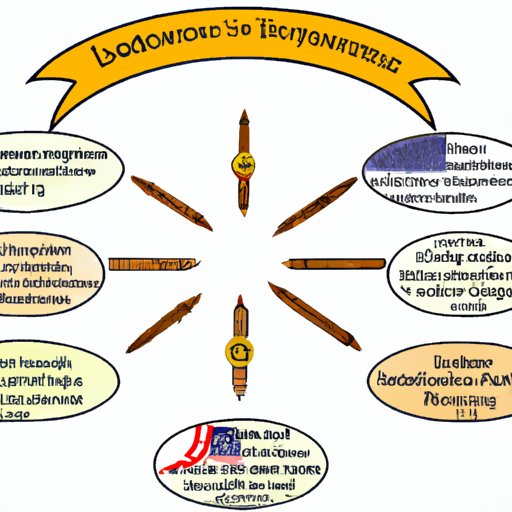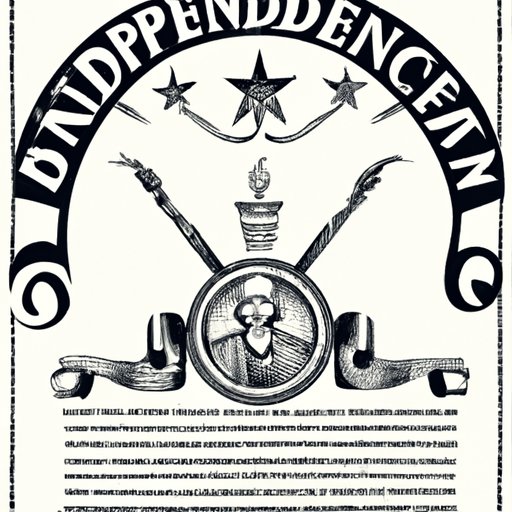Introduction
The Declaration of Independence is one of the most important and revered documents in American history. It represents the birth of a new nation and the founding of democracy as we know it today. Written by Thomas Jefferson, the Declaration of Independence was adopted on July 4, 1776, by the Continental Congress. The document declared the 13 British colonies in America to be free and independent states, no longer subject to British control. This article explores the motives behind the Declaration of Independence and the revolutionary ideas that shaped American history.
Uncovering the Motives Behind the Declaration of Independence
The motivations behind the writing of the Declaration of Independence are complex and multifaceted. The document was written as a response to British tyranny and oppression against the American colonies. Many colonists felt that they were being unjustly taxed and controlled by the British government without any representation in Parliament. The Declaration of Independence was written to make it clear to the world that the American colonies would not be subjected to British rule any longer.
The political climate during this time was also ripe for revolution. In Europe, the Age of Enlightenment was in full swing, and revolutionary ideas were spreading rapidly. People were starting to question traditional beliefs and norms, and were beginning to conceive of new forms of government and social structures. The Declaration of Independence was a product of this revolutionary spirit, and it embodied many of the ideas that were being circulated at the time.
The Revolutionary Ideas That Led to the Writing of the Declaration of Independence
The ideas that influenced the Declaration of Independence were radical and disruptive. The document challenged traditional beliefs about monarchy, divine right, and the role of government in society. It argued that all people had certain inalienable rights, including the right to life, liberty, and the pursuit of happiness. It also argued that government should be based on the consent of the governed and that if a government failed to protect the rights of its citizens, the people had the right to overthrow it.
The Declaration of Independence was a powerful statement of these radical ideas, and it helped to inspire social and political change not only in America but throughout the world. Its influence on the French Revolution and other movements of the time cannot be overstated, and it continues to inspire people today who are fighting for democracy and freedom.
The Role of the Enlightenment in Inspiring the Declaration of Independence
The Enlightenment was a philosophical movement that originated in Europe during the 17th and 18th centuries. It was a time of intellectual ferment and radical new ideas about science, reason, and human nature. Enlightenment thinkers such as John Locke and Jean-Jacques Rousseau were major influences on the Founding Fathers who wrote the Declaration of Independence. They believed in the inherent goodness and rationality of human beings, and in the power of reason to create a just and equitable society.
The ideas of the Enlightenment infused the Declaration of Independence with its revolutionary spirit. It is why the document argues for the rights of individuals and the limitations of government power, and why it insists that government must be based on the consent of the governed. These ideas continue to shape modern politics and remain as important today as they were in 1776.
Revisiting the Historical Events That Necessitated the Writing of the Declaration of Independence
The Declaration of Independence did not come out of nowhere. It was the culmination of a series of events that had been building up for years. These events included the Stamp Act of 1765, which imposed taxes on paper goods in the colonies, and the Boston Tea Party of 1773, in which American colonists dumped tea into Boston Harbor to protest British taxation without representation.
These events turned into a full-blown revolution as the British government tried to suppress the colonists’ resistance. Battles such as Lexington and Concord and Bunker Hill marked the beginning of the Revolutionary War in 1775. The Declaration of Independence was therefore written as a declaration of war against the British government and as a way of rallying support for the American cause.

Examining the Key Personalities and Their Influences on the Declaration of Independence
The Founding Fathers who wrote the Declaration of Independence were a diverse group of individuals, each with their own unique perspectives and influences. Thomas Jefferson, who served as the main author of the document, was heavily influenced by ideas from the Enlightenment and by the works of John Locke. Benjamin Franklin brought a sense of practicality and pragmatism to the document, while John Adams helped to rally support for the cause of American independence.
The contributions of these individuals and others helped to shape the document into the powerful statement of revolutionary ideas that it is today. Without their input and influence, the Declaration of Independence may never have been written.
Tracing the Origins of the Declaration of Independence in Colonial Protests and Resistance Movements
The Declaration of Independence did not come out of a vacuum. It was the product of years of colonial protests and resistance movements against British rule. These movements included the Sons of Liberty, who organized protests and rallies in Boston, and the Committees of Correspondence, who spread information and news throughout the colonies.
The influence of these movements can be seen in the language and tone of the Declaration of Independence. The document was written to rally support for the cause of American independence and to inspire people to join the revolutionary movement. Its powerful rhetoric and revolutionary spirit continue to inspire people today who are fighting for social and political change.
Why the Declaration of Independence Remains a Landmark Document in American History and Global Politics
The Declaration of Independence remains one of the most important and influential documents in American history and global politics. It represents the birth of a new nation and the founding of democracy as we know it today. Its ideas of individual rights, limited government power, and the consent of the governed continue to inspire people around the world who are fighting for freedom and justice.
The Declaration of Independence is a reminder of the power of revolutionary ideas to change the world. Its revolutionary spirit and commitment to freedom and individual rights continue to inspire people today who are fighting for social and political change. It is a testament to the enduring legacy of the American Revolution and to the power of democracy to shape the course of human history.
Conclusion
The Declaration of Independence is a powerful document that represents the birth of a new nation and the founding of democracy as we know it today. Its revolutionary ideas challenged traditional beliefs and norms, and its commitment to individual rights and limited government power continue to inspire people today who are fighting for freedom and justice. The Declaration of Independence is a reminder of the power of revolutionary ideas to change the world, and its influence on American history and global politics cannot be overstated.
